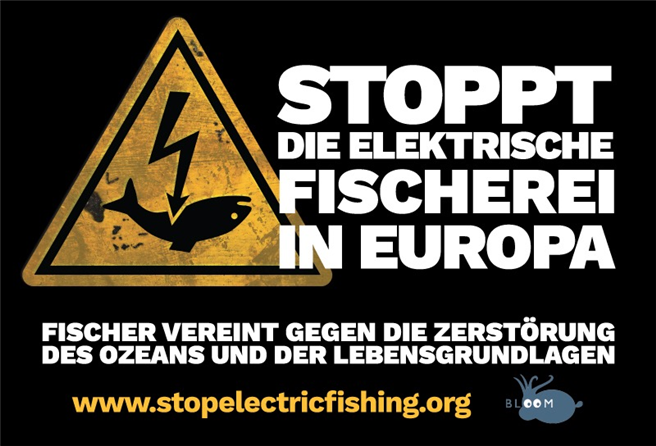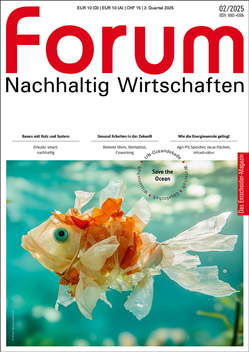Unprecedented EU-wide mobilization of fishers against electric fishing
#FishersUnited #FishersResist
Small-scale and traditional fishers of various nations are mobilizing in ports in a
simultaneous action of resistance to protest against electric fishing and to call on public
decision-makers to definitively ban electric fishing in the EU.
 © BLOOM
© BLOOMElectric fishing was forbidden in Europe in 1998 but the European Commission proposed to
authorize it as of 2006 under an exceptional derogation regime. This decision, which went
against the explicit scientific advice provided to the Commission, is causing far-reaching
chaos: as a result, an entire commercial fleet converted to a prohibited, destructive fishing
method under the guise of experimental and scientific licenses, but by the public admission
of the Dutch government, scientists and fishing industry, such scientific activities were not
conducted. The Dutch government and European Commission have also been mutually guilty
of providing electric licenses well beyond the authorized legal limit.
From a financial point of view, electric fishing has become a symbol of the biased
arbitration of public authorities in favour of an over-represented, politically powerful
fishing lobby. To save the nearly-bankrupt and high-impact beam trawl fleet, politicians
renamed a destructive fishing method (electric fishing) as "innovative”, thus allowing them
not only to practice this prohibited fishing method but to obtain millions of euros of public
subsidies to equip beam trawlers with electrodes at the expense of taxpayers and European
citizens.
This file is a European embarrassment comparable to scientific whaling . It contradicts all
EU commitments to sustainability, breaks EU rules of financial transparency and tramps legal
obligations to ensure equitable access to resources among fishers. Finally, electric fishing
also treads on regulatory objectives of environmental restoration and use of public monies.
The worst part though is that public policies are caught red-handed destroying not just the
marine environment, but employment . And although proven wrong, decision makers and
politicians at EU or national levels persist in defending the worst fishing practices instead ofthe best ones. For example, while electric trawlers discard between 50 to 70%1 of fish
caught,
gillnetters only discard a maximum of 6%.2 Similarly, for one liter of fuel burnt, gillnetters
catch up to 6 times more fish (2 to 3 kilos) than electric trawlers (450 grams).
Despite the obvious socio-economic and ecological merits of coastal fishing methods used by
small-scale and traditional fishers, the most destructive, fuel-intensive and
subsidy-dependent fishers catch the ear of politicians.
In every aspect, electric fishing shames Europe.
Over the years, the depletion of fish along the coastline of the North Sea has brought
traditional fishers to the brink of economic collapse. As an example, between 2014 and
2018, French gillnetters from the North have lost on average 50% of their catch of sole.3
Industrial lobbies, year after year, have gained control over "producer organizations” (which
allocate fishing quotas), political representation bodies, port management structures and
fleet ownerships. Small fishers have been slowly but surely forced to silence because if they
dare speak up against dominant actors, retaliation is immediate and fierce (quotas, fishing
rights, licenses etc.)
Their future is as pitch black as a tunnel with no light at the end . It took reaching that level
of despair and being on the verge of bankruptcy for fishers to denounce the oppression of
industrial actors in their fishing quarters. They are now determined to fight until the end,
until electric fishing is fully and definitively banned.
The coalition of NGOs and fishermen launched a collective platform of action to call on
decision makers.
Kontakt: Wolfgang Albrecht, Fischereischutzverband – Schleswig-Holstein | fischereischutzverband-sh@web.de
Umwelt | Umweltschutz, 15.06.2018

Save the Ocean
forum 02/2025 ist erschienen
- Regenerativ
- Coworkation
- Klimadiesel
- Kreislaufwirtschaft
Kaufen...
Abonnieren...
07
MAI
2025
MAI
2025
MakerCamp Genossenschaften 2025
Genossenschaftliche Lösungen in Wirtschaft, Kommunen und Gesellschaft
65189 Wiesbaden
Genossenschaftliche Lösungen in Wirtschaft, Kommunen und Gesellschaft
65189 Wiesbaden
08
MAI
2025
MAI
2025
Die intelligente Transformation: ESG + KI = Zukunftssicherung
Wer Nachhaltigkeit ohne KI umsetzt, verpasst entscheidende Chancen
Webinar
Wer Nachhaltigkeit ohne KI umsetzt, verpasst entscheidende Chancen
Webinar
14
MAI
2025
MAI
2025
Klimaschutz im peruanischen Regenwald
Delegierte der Asháninka teilen ihre Perspektiven
80802 München, Seidlvilla
Delegierte der Asháninka teilen ihre Perspektiven
80802 München, Seidlvilla
Professionelle Klimabilanz, einfach selbst gemacht

Einfache Klimabilanzierung und glaubhafte Nachhaltigkeitskommunikation gemäß GHG-Protocol
Politik
 Hat das Instrument der Demonstrationen ausgedient?
Hat das Instrument der Demonstrationen ausgedient?Christoph Quarch betrachtet die Massendemonstrationen in Georgien, Serbien und der Türkei
Jetzt auf forum:
Informationen, Literatur und Studien zum Thema „Sales for Good“
Nachhaltigkeit in der Zeitenwende: Vom Abschwung zur Auferstehung?
SAVE LAND. UNITED FOR LAND - noch bis 01. Juni in der Bundeskunsthalle in Bonn
Nachhaltigkeit: Wer jetzt handelt, gewinnt!
Dialog und Kooperation – Sie sind gefragt!
Gesundheits- und Sozialwirtschaft muss auf dem Weg zur Klimaneutralität unterstützt werden



















